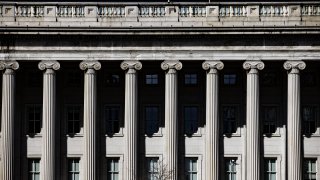
Adam McKay's recent movie, "Don't Look Up," was a timely example of how our elected leaders react to crises. In the film, a comet is about to destroy all civilization, but the country's leaders don't pay much attention until it is too late and we are all doomed.
Welcome to our next major debt crisis.
In just a few years, over half of every dollar we pay in income taxes will go to pay the interest on our national debt owned by the public. And it will get worse.
When that financial comet strikes, what will our politicians say or do?
Get Tri-state area news and weather forecasts to your inbox. Sign up for NBC New York newsletters.
First, let's have a look at how we got here.
Most informed Americans are aware that the national debt and interest rates are both rising. Americans will soon wake up to the fact that the interest on our national debt is costing taxpayers a frightening percentage of our national income and wealth.
The comet is about to hit.
Money Report
According to the U.S. Treasury, in fiscal 2021, the amount of interest paid on the national debt was $562 billion including government transfers. The amount actually paid out to holders of U.S. securities was $413 billion.
That figure alone, which is over 20% of what we paid in income taxes in FY 2021, should be alarming when compared to other government expenditures.
Compare the $413 billion we pay in interest to holders of these securities to the annual budgets of other parts of the government. The State Department annual budget is "only" $35 billion and the Justice Department $39 billion.
But this interest rate crisis will soon get worse, a lot worse.
Cost of debt is on the rise
Here's why: According to the Congressional Budget Office, the average interest rate paid on the national debt in FY 2021 was approximately 1.5%, historically a very low figure.
Most experts agree that interest rate increases are coming, and a consensus expectation is that there will be three or four rate hikes by the Federal Reserve in 2022. The central bank on Wednesday strongly hinted that the first rate hike will happen in March, and the market is now pricing in as many as five increases this year alone.
As interest rates rise, which they have in dramatic fashion in January, so will the interest rate paid on newly issued Treasury securities. While this is happening, our national debt is exploding.
In 2017, the national debt was $20 trillion. Just four years later, that amount is approaching $30 trillion. The recent stimulus programs brought on by the Covid crisis helped add a staggering $6 trillion to the total.
The math is easy.
Interest rates are still near an all-time low. According to the Monthly Treasury Statement, in 2001, interest paid on the national debt was an average of 5.4%, about 3½ times what it is now.
If we get back to that rate, which is far from inconceivable, interest on the debt would cost American taxpayers $1.4 trillion, based on our present level of national debt. That is twice the budget of the Defense Department.
In FY 2021, the total amount of personal income taxes collected was $1.9 trillion. Moreover, the future budget deficits projected by economists will add over a trillion dollars a year to the overall debt, adding substantially to the rising interest cost.
The interest rate comet is now visible on the horizon.
Americans will not stand for a situation where most of the income taxes we pay go to pay interest to holders of our national debt who live in Japan, China, the U.K. along with others here who own Treasury securities.
How will Congress react to this crisis? We won't have to wait too long to find out.
Peter Tanous is an author and founder and chairman of Lynx Investment Advisory. His most recent book is The Pure Equity Plus Plan. He also has written two books with CNBC.com Finance Editor Jeff Cox.






